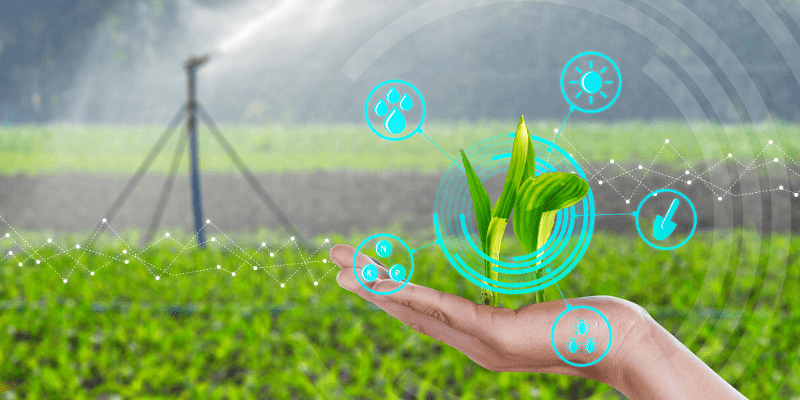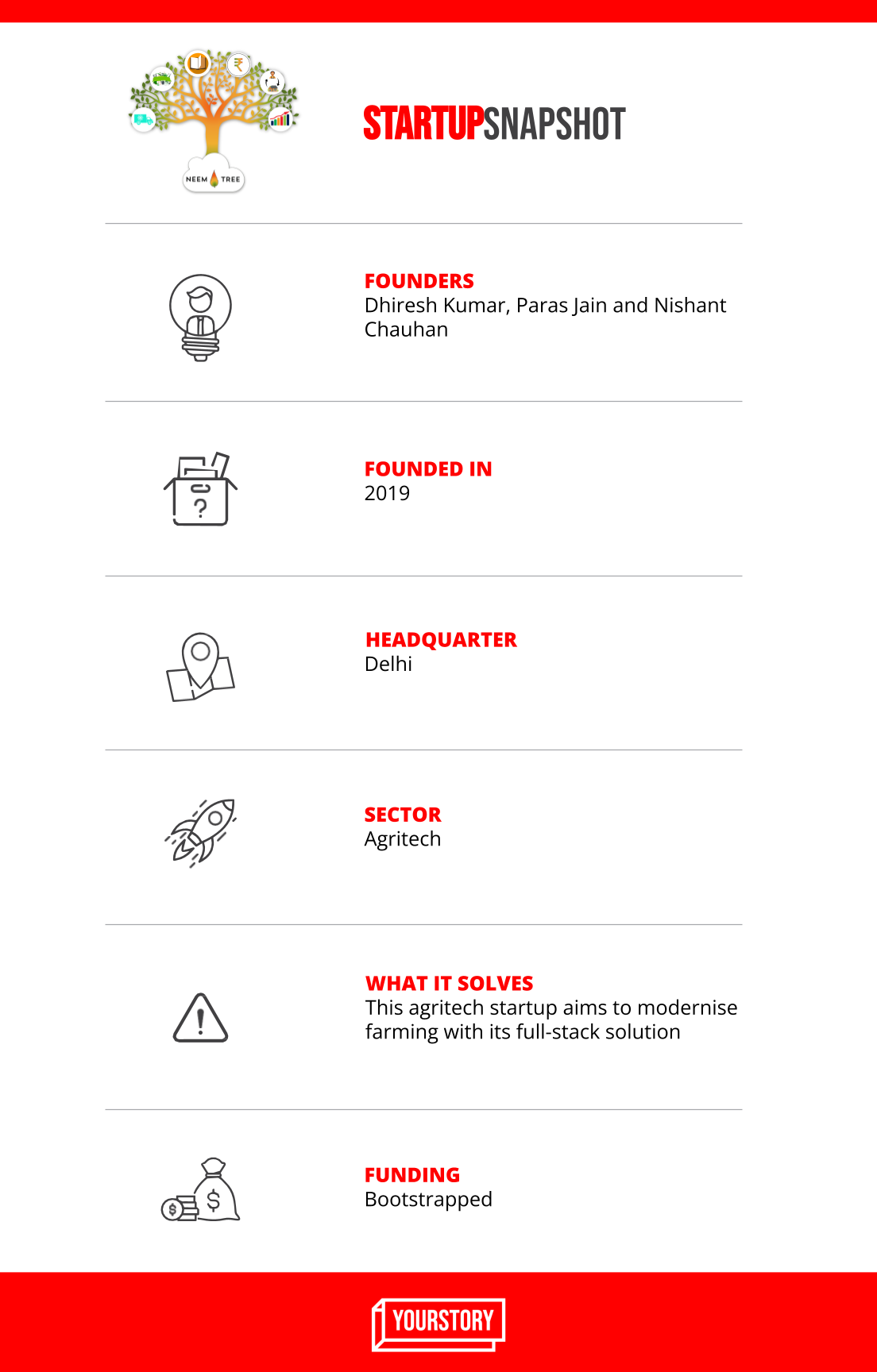According to an estimate, 70 percent of rural households in India are still dependent on agriculture. Most farmers tend to practice traditional agriculture, solely relying on their limited knowledge of crops and agronomy vis-a-vis what crops to be sown, how much fertilizer needs to be used, when to irrigate, and what farm practices to follow. This lack of knowledge coupled with poor decision-making leads to low crop productivity and farmer income.
Founded in 2019 by Dhiresh Kumar, Paras Jain and Nishant Chauhan to solve this problem using the help of technology, Delhi-based Neem Tree Agro Solutions provides a data-driven crop enhancement application called NT-Kisan. It facilitates decision-making and helps farmers grow crops efficiently and bountifully.
The app monitors several variables which impact the quantity and quality of produce. Considering these input factors (soil type, weather prediction, soil health, and nutrients), NT-Kisan analyses and predicts the short-term and long-term impacts on the quality and quantity of the produce.

“The journey begins right from the time of sowing. Based on the weather forecast and soil parameters, the farmer is recommended the five best crops he can sow. Every recommendation is unique to the farm parameters,” Dhiresh Kumar, Co-founder and CEO, Neem Tree Agro Solutions, tells YourStory.
Once the crop has been sown, the app, currently available for Android users, will continuously share updates regarding weather, irrigation, fertilizers, and pesticides usage, along with offering suggestions on the systematic implementation of scientific techniques, and providing critical information.
“In case of a pest attack or diseased crop, the crop can damage to an irreparable extent if proper actions are not be taken in the stipulated time. In such cases, a simple picture of a damaged crop can be uploaded on the application which can detect pest attack/diseased crops, and suggest the most appropriate and efficient treatment. This is done using an image recognition model which is a part of the application,” he adds.
The image recognition model by Neem Tree is trained using thousands of images (and still counting)m and is hosted on Google Cloud for a seamless performance. The startup claims that the app can predict and recognise the pest/diseased plant with an accuracy upwards of 95 percent.
The app is built on top of data from various sources (including weather, production and soil), segregated district-wise, clustered and correlated. This is integrated with the knowledge of agronomy to give the best possible results.
The agritech startup also conducts field visits on a weekly or monthly basis to meet the farmers and familiarise themselves with the problems.
The USP
Neem Tree aims to become a one-stop destination for farmers for all agriculture-related knowledge – right from which crop to sow, how to grow, and where to sell. The startup has also focused on developing a positive relationship between the organisation and the target customers. This has been achieved by organising weekly and monthly meetings on the field with farmers and also the targeted customers.
“We are one of the few end-to-end agritech players and own the end-to-end relationship with the farmer. Right from input selection and delivery to crop management, we leverage data across these stages to also offer services to create value across the chain. We are a full-stack solution to the farmers unlike the rest of the companies in this field that offer similar solutions but in bits and pieces,” Dhiresh notes.
“A farmer of India wants to satisfy all his needs from a single shop, which is currently the input retailer. We replicate the same on our digital platform with our physical presence i.e Kisan Suvidha Kendra — kirana shops that orders agri-inputs on behalf of farmers,” he adds.
Neem Tree Agro aims to benefit farmers in three ways – reduction in the cost of cultivation while buying inputs; improvement in farm productivity due to timely and customised advisory; and better farm gate price.
“Consequently, farmers may experience more than a 50 percent increment in their net income,” Dhiresh says.
The team
Dhiresh, Nishant, and Paras are school friends. While roaming through Tier-II and III cities as college students in the summer of 2018, they understood the problems faced by farmers and decided to create something that would cater to the needs of the farming community.
“Being a group of two engineers and one from an agricultural background, we used to think and brainstorm on how we can solve this interesting problem using the help of technology, and that’s how the idea of Neem Tree Agro Solutions came into existence,” says Dhiresh.
An engineer by profession and an entrepreneur by passion, Dhiresh pursued BTech from Netaji Subhas Institute of Technology and gained experience in management, business development, social entrepreneurship, and business leadership. He also has experience in brand building, brand architecture and corporate communications.
Chief Technology Officer (CTO) Paras is proficient in the fields of web, application and software development. Presently an engineering student at Bharati Vidyapeeth's College of Engineering, Paras has experience in graphic designing, ethical hacking and AI/ML, and cloud computing.
The Chief Financial Officer (CFO) and Head of R&D, Nishant was a student of organic agriculture and food business at Amity University, and also has a five-year experience in management. An advocate of social rights, he started an initiative named ‘Massomyiat‘ against sexual abuse of children which received many accolades from the likes of Doordarshan.
The team consists of the founders along with one full-time employee.
Funding and monetisation
Started with an investment of just Rs 3,000, Neem Tree Agro earlier raised a grant of Rs 7 lakh from IIT, Delhi, and a grant of Rs 5 lakh from NASSCOM Foundation to implement their idea.
“We are in early talks with investors for Pre-Series A funds,” says Dhiresh.
Neem Tree works on a B2C model in which it acts as a middleman between manufacturers and farmers.
“Our solution is going to be absolutely free and at the same time, transactions (on agri-inputs including but not limited to seeds, fertilizers, pesticides and insecticides) done by each farmer after associating with Neem Tree for two to three seasons can reach approximately Rs 45,000 per year. Neem Tree’s technology is built on a highly cost-effective and sustainable model. We share the margins for agri-inputs with Kisan Suvidha Kendra,” he adds.
Kisan Suvidha Kendra also acts as an agent for Neem Tree Agro for application downloads, delivery points, authorized stores to return/replace products, place orders on behalf of farmers, etc.
“We don’t build any physical shops/stores for the sale of agri-inputs as it involves a very high cash burn with slower returns on the investments. Our model is absolutely asset-lite, which makes it the most scalable of all the models in the market currently. Due to Kisan Suvidha Kendra, our customer acquisitions are completed by these nodes instead of sales agents, which keep our costs of acquiring the customers to just two digits,” Dhiresh states.

The way ahead
The Indian agritech sector witnessed an unprecedented boom in 2020-21 with the pandemic catalysing tech adoption. It is already expected that 2022 will be much bigger than 2021 for the sector in terms of investments, innovation, growth, and impact.
As per the latest report by Bain & Co, the agritech sector is poised to grow into a $30-35 billion market by 2025.
“We cater to almost 80 percent of the farmers of the Trans-Yamuna Belt of Delhi-NCR. Even though the farmers there are not tech-savvy, they still adopted the technological approach with ease,” says Dhiresh.
“As we move ahead in time, we are also planning to add other relevant services for farmers such as credit, insurance, and farm equipment. Neem Tree Agro plans to expand in Haryana by the end of 2022 with a potential client base of 12,000 farmers and annual revenue of Rs 8 crore,” he adds.
It has onboarded 25 nodes and has 700+ acres of land under its management. It also has 500+ farmers associated with it and has a retention rate of 60 percent.
It competes with the likes of Bharat Agri, DeHaat, IFFCO Kisan, and PlanTix among others.
Edited by Kanishk Singh

